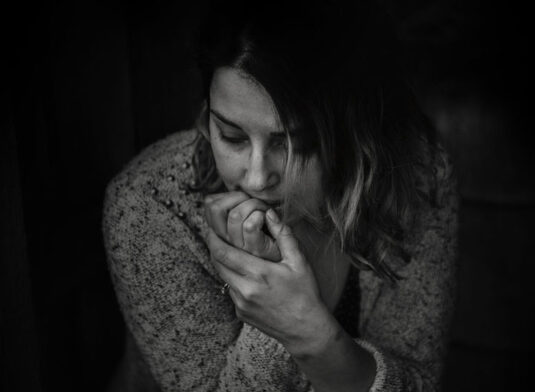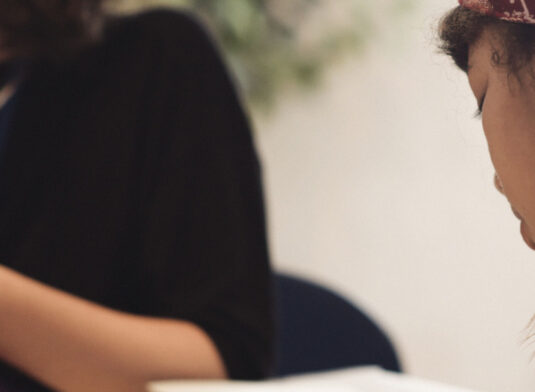
Hazel – “In 2018, I moved to a new city for university. I was very supported for a long time, but when I came out as more queer and more gender queer, and when more people in my life were queer and trans, I suddenly had a lot of pushback from my parents. My parents were really, really not supportive, and it eventually led to us getting kicked out. We then stayed with Milo’s parents for a little bit, but we ended up getting kicked out of there for similar reasons. We stayed nearby for a bit, moving around a little, but we’d wanted to be in Brighton for so long, where we had friendships and connections, where we have a good support system, albeit small.
“We just sort of planned a one-week stay in Brighton with one of our friends, and then another one-week stay with a different friend, so we essentially gave ourselves two weeks to build a bed in our van and start surviving in it.
“The cold was our first issue that we ran into…”
Milo – “The cold is one of the worst parts about being homeless. It was January when we moved to Brighton, and every night was absolutely freezing. We didn’t have much in the van, just a really tiny, uncomfortable bed. We were able to get sleeping bags from the Clock Tower, and that was so helpful.”

Hazel – “We mentioned to everyone at Clock Tower about how hard we were finding the cold, and we got given sleeping bags, we got given blankets, Milo got a tracksuit and I got some thermals. We made it through the winter and were a lot warmer with all that.”
Milo – “It was also so hard, especially when we first moved here, getting used to sourcing good, nutritional food…”
Hazel – “We were mostly just living off bags of leftovers from cafes, just pastries and bread and things like that. We have a small camping hob in the van, but it’s really difficult to use, especially in the winter, or when it’s windy or raining. We can’t really cook, so it’s been helpful to come here, have breakfast in the morning, lunch in the afternoon, and then we only really need to source dinner, and a lot of the time, we leave the Clock Tower with leftovers, and we can take it back for dinner. So coming here for just a couple of hours, it sets up our meals for the rest of the day, which is really useful, and it means that we have a lot more mental energy and time to sort out other things. Otherwise, most of the day would be spent worrying about, “Where are we getting our next meal from, like what are we going to do?”
“We’re both neurodivergent, and we also have physical health conditions that need to be diagnosed and treated, which makes it kind of difficult to work, and obviously not being housed makes it even more difficult. It takes so much mental energy and time to think about our daily routines, things like, “When and where are we going to shower, or eat, or do our washing?”
Milo – “It’s hard being ill in the van as well; I have CVS (cyclical vomiting syndrome), so when I’m sick, I’m like really sick. You need a hot shower, you need a hot bath, you need warmth. It’s hard to be sick when you’re not indoors.”
Hazel – “I stumbled across the Clock Tower when I was doing some online research, just looking for any resources we could access. We came because I saw that we could do our clothes washing for free, which was great because we couldn’t really afford to do our washing at a laundrette. So we just popped in, said hello, and asked if we could do some washing. We met George who was really friendly, and he got us started and all signed up. Since then, we’ve been back so many times and been helped with so many different things. We’ve had advice, help with all of the essentials…”
Milo – “Everything – food, showers, clean clothes…”
Hazel – “And advice too, like I’ve spoken to a few people downstairs about my healthcare and getting help with the van. The Youth Voice Group has been a big help as well in terms of getting payment vouchers, especially as neurodivergent people, sometimes it’s a bit difficult to find cheap food that doesn’t cause stomach issues or like a mental meltdown.”
Milo – “Yeah and even though I’m 26 now and too old for the service, I can still be a part of the Youth Voice Group, and that helps me stay fed too. I was only here for about two months before I turned 26, but we gave feedback and helped with the Clock Tower’s sensory room that was being introduced. It was cool to add some things and offer ideas.”
Hazel – “And you can still access advice with things like benefits… Clock Tower’s just helped us so much, like it’s really become… well it is a sanctuary, it’s become our sanctuary for sure.”
Milo – “It’s a very safe, very welcoming place. It’s also super diverse, and the diverse community made it a lot easier for me to come in and feel comfortable.”
Hazel – “Yeah I’d also describe it as very accessible and very diverse. I love how there’s a lot of emphasis on how every individual is different and their own person, and for everyone to be accepting of that. As a non-binary person who is very gender queer, I’ve never felt like that’s been scrutinised, I’ve never felt like that’s been invalidated or anything. And every time I come here, I’ve always felt super supported and really validated. If I’ve had an issue, which has happened, we’ve spoken to Clare and it’s all been sorted and dealt with really well.
“I don’t feel like I’ve had to educate anybody, specifically on like my gender identity, like people have just been very accepting, very diverse, and just really lovely.There’s been a few times I’ve been a bit emotional after we’ve left because everyone’s just been so nice. I’ll have just spoken about one thing that I’m struggling with, and like I’ve had two people come in, giving me loads of advice, and saying, “I can support you with this, or I can do this phone call with you, or we can set up a meeting for you.” I’ve just been so overwhelmed with how nice people have been to us.
“We’ve also made friends at the Clock Tower, and that’s made us feel a lot less alone in our situation. It’s shown us that homelessness really can happen to anyone, and it’s helped with the mental load of carrying the guilt and shame of “is this our fault?”
Milo – “There’s a real sense of community here.”
Hazel – “We wouldn’t be where we are right now without the Clock Tower; I think we would be like 72 steps behind where we are right now. If we hadn’t found the Clock Tower, it would’ve been a lot more difficult to keep ourselves clean, keep our clothes clean, keep ourselves fed. We weren’t able to eat a lot of fresh food before coming here, and the meals were so like varied and balanced and tasty.”
Milo – “I don’t think we would have been very well without it.”
Hazel – “Since our first visit, I’ve managed to get a couple of different jobs. When we first came, I started a new job, and I would pop in and have breakfast before heading up the train station, and Clock Tower helped me with lots of things, like thicker socks and a water bottle. It was just these little things that made working more accessible. I’m doing a different job now, but if it wasn’t for the support from the Clock Tower, I probably wouldn’t have even started the other job in the first place.”

Hazel – “In the future, we would love to get a bigger van. We would love to upgrade our current van into something that’s more ‘us’, as well as more functional and practical. Maybe in a few years, get a bigger van, upgrade that too and do that up. I want to continue being creative and making crafts, but also money is a thing.”
Milo – “We will never own property because we want to do what we love.”
Hazel – “I would also love to live in a queer commune – do community living where we can grow our own food, be more self-sufficient, and not have to subscribe to capitalism.”
Milo – “I also think that everyone forgets that they’re also just one, two, maybe three pay cheques away from being in the exact same position as us.”
Hazel – “I think that people judge homeless people a lot, and they often think that it’s through faults of their own, that they’ve put themselves there, they’ve chosen that path in life, they’ve made the wrong decisions which have led to them becoming homeless. But the reality is, it’s not about a series of wrong decisions… like I said, I had a lot of support, I have two degrees, I have so much that should be enough to keep us from being homeless. But we are. Whether it’s because of health issues, mental struggles, physical disabilities, unsupportive families… families that do a 180 and suddenly take away their support – that was a big shock for me, to just suddenly have nothing.”
"Homelessness is not a moral indicator. If somebody is homeless, it’s not an indication of their personality, or their morals, or their criminal record. Sometimes becoming homeless is unavoidable."
Donate
Could you help us by making a one-off or regular gift? You can offer a lifeline to a young person who has nowhere else to turn. Please consider making monthly donation of:
£10
Could help fund our drop-in centre to provide a safe space, hot meal, showers, and laundry facilities on a regular basis.
Donate£22
Could help pay for pots, pans, and other kitchen essentials for a young person moving into a new home.
Donate£55
Could help fund one-to-one support to assist a young person into suitable accommodation that they can call a home.
Donate


